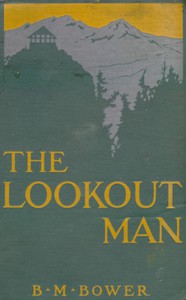The Lookout Man by B. M. Bower (good books to read for adults .txt) 📗

- Author: B. M. Bower
Book online «The Lookout Man by B. M. Bower (good books to read for adults .txt) 📗». Author B. M. Bower
First of all, he awoke to the fact that he was about as important to the world as one of those little brown birds that hopped among the rocks and perked its head at him so knowingly, and preened its feathers with such a funny air of consequence. He could not even believe that his sudden disappearance had caused his mother any grief beyond her humiliation over the manner and the cause of his going. She would hire some one to take care of the car, and she would go to her teas and her club meetings and her formal receptions and to church just the same as though he were there—or had never been there. If he ever went back.... But he never could go back. He never could face his mother again, and listen to her calmly-condemnatory lectures that had no love to warm them or to give them the sweet tang of motherly scolding.
It sounds a strange thing to say of Jack Corey, that scattered-brained young fellow addicted to beach dancing and joy rides and all that goes with these essentially frothy pastimes; a strange thing to say of him that he was falling into a more affectionate attitude of personal nearness to the stars and to the mountains spread out below him than he had ever felt toward Mrs. Singleton Corey. Yet that is how he managed to live through the lonely days he spent up there in the lookout station.
When Hank was about to start with another load of supplies up the mountain, Jack had phoned down for all of the newspapers, magazines and novels which Forest Supervisor Ross could buy or borrow; also a double supply of smoking tobacco and a box of gum. When his tongue smarted from too much smoking, he would chew gum for comfort And he read and read, until his eyes prickled and the print blurred. But the next week he diffidently asked Ross if he thought he could get him a book on astronomy, explaining rather shame-facedly that there was something he wanted to look up. On his third trip Hank carried several government pamphlets on forestry. Which goes to prove how Jack was slowly adapting himself to his changed circumstances, and fitting himself into his surroundings.
He had to do that or go all warped and wrong, for he had no intention of leaving the peak, which was at once a refuge and a place where he could accumulate money; not much money, according to Jack's standard of reckoning—his mother had often spent as much for a gown or a ring as he could earn if he stayed all summer—but enough to help him out of the country if he saved it all.
When his first four days vacation was offered him, Jack thought a long while over the manner of spending it. Quincy did not offer much in the way of diversion, though it did offer something in the way of risk. So he cut Quincy out of his calculations and decided that he would phone down for a camp outfit and grub, and visit one or two of the places that he had been looking at for so long. For one thing, he could climb down to the lake he had been staring into for nearly a month, and see if he could catch any trout. Occasionally he had seen fishermen down there casting their lines in, but none of them had seemed to have much luck. For all that the lake lured him, it was so blue and clear, set away down there in the cupped mountain top. Hank had advised him to bait with a salmon-roe on a Coachman fly. Jack had never heard of that combination, and he wanted to try it.
But after all, the lake was too near to appeal to him except by way of passing. Away on the next ridge was the black, rocky hump called Grizzly Peak on the map. Hank spoke of it casually as Taylor Rock, and sometimes called it King Solomon. That was where the bears had their winter quarters, and that was where Jack wanted to go and camp. He wanted to see a bear's den, and if the bears were all gone—Hank assured him that they never hung out up there in the summer, but ranged all over the mountains—he wanted to go inside a den and see what it was like. And for a particular, definite ambition, without which all effort is purposeless, he wanted to kill a bear.
Hank brought him all the things he needed, talked incessantly of what Jack should do and what he shouldn't do, and even offered to pack his outfit over to the Peak for him. So Jack went, and got his first taste of real camping out in a real wilderness, and gained a more intimate knowledge of the country he had to guard.
By the time his second relief was at hand, he was tempted to take what money he had earned and go as far as it would take him. He did not believe he could stand another month of that terrible isolation, even with his new friendliness toward the stars and the forest to lighten a little of his loneliness. Youth hungers for a warmer, more personal companionship than Nature, and Jack was never meant for a hermit. He grew sullen. He would stand upon his pinnacle where he could look down at Crystal Lake, and hate the tourists who came with lunches and their fishing tackle, and scrambled over the rocks, and called shrilly to one another, and laughed, and tried to invent new ways of stringing together adjectives that seemed to express their enthusiasm. He would make biting remarks to them which the distance prevented their hearing, and he would wish savagely that they would fall in the lake, or break a leg on some of the boulders.
When those with a surplus of energy started up the steep climb to the peak, he would hurry into his little glass room, hastily part and plaster his hair down as a precaution against possible recognition, and lock his door and retire to a certain niche in a certain pile of rocks, where he would be out of sight and yet be close enough to hear the telephone, and would chew gum furiously and mutter savage things under his breath. Much as he hungered for companionship he had a perverse dread of meeting those exclamatory sightseers. It seemed to Jack that they cheapened the beauty of everything they exclaimed over.
He could hear them gabble about Mount Lassen, and his lip would curl with scorn over the weakness of their metaphors. He would grind his teeth when they called his glass prison "cute," and wondered if anybody really lived there. He would hear some man trying to explain what he did not know anything at all about, and he would grin pityingly at the ignorance of the human male, forgetting that he had been just as ignorant, before fate picked him up and shoved him head-foremost into a place where he had to learn.
Sometimes he was not forewarned of their visits, and would be trapped fairly; and then he would have to answer their foolish questions and show them what the map was





Comments (0)